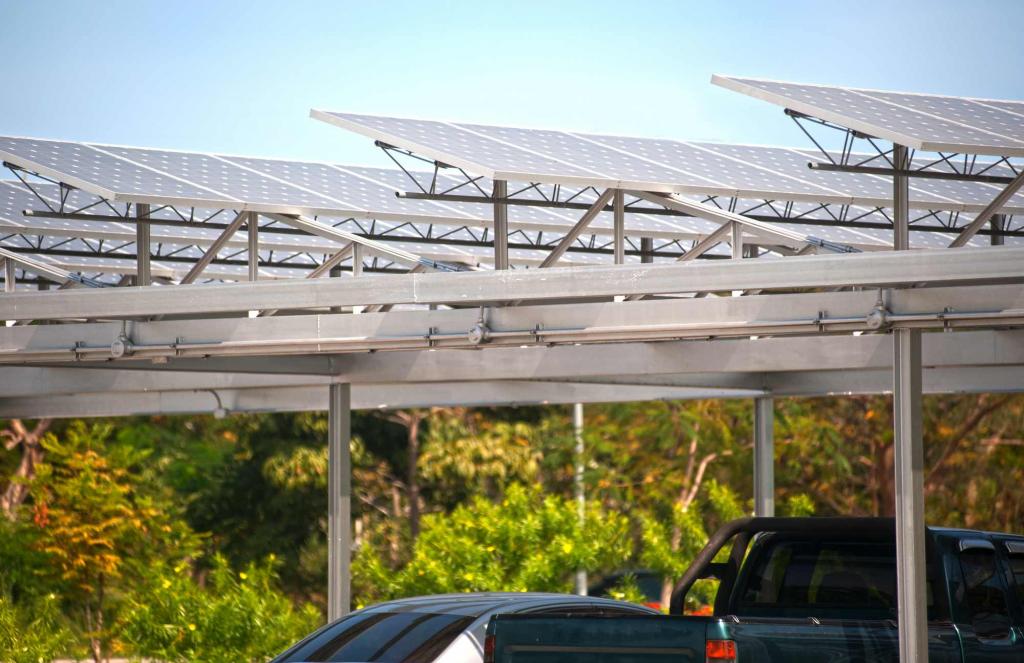Thessaloniki gets ready for its metro launch in November
The underground rapid transit lines have been under construction for almost two decades due to various project delays
 TheMayor.EU logo
TheMayor.EU logo 
Solar car parks in Tyrol could produce up to 283-gigawatt hours of solar power per year, Source: Depositphotos
The Austrian state aims to prevent the use of high-yield agricultural land, as food production is more important than energy
Yesterday, authorities in the Austrian Federal State of Tyrol published a study on the potential of photovoltaic (PV) systems in the area. The study recommended that authorities start using soil-sealed car parks for new solar installations, as opposed to green space and framing areas.
According to an official statement, Energy and Agricultural Councilor Josef Geisler explained that the study has caused a shift in the state’s energy strategy for 2050. By that point, Tyrol needs to have at least 20% of the energy mix dedicated to photovoltaics and the question of location, location, location is becoming more pressing by the year.
Open-air car parks are one of the most inefficient uses of land, as they take up large areas that are fully soil-sealed, that could otherwise be used for either green spaces, housing and etc. At the same time, they are a necessary feature of modern cities and, as Councillor Geisler explained, they can become functioning energy batteries, fuelling the sustainable transition.
According to the study, in Tyrol, there are currently 3,400 open-air car parks, covering an area of 5.6 million square metres. If they are all covered in PV systems, they could produce up to 283 gigawatt hours of solar power per year, enough to power 81,000 households.
While this policy could be a significant contribution to sustainable energy development in Tyrol, the state still plans to cover most of its photovoltaic needs with roof and wall systems. This amounts to around 3,900 gigawatt hours of electricity by 2050.
However, placing car parks at the centre of the initiative would help to prevent the state from losing valuable agricultural land or having to construct PV systems on Natura 2000 protected natural areas or using spaces where sunlight is not optimal.
Councillor Geisler explained that without heavy infrastructure interventions, the state could generate a lot of what it already needs from land that is already sealed. He pointed out that this is a great reason to attack high-yield agricultural land. He continued: “Food production is a priority over energy production.”

The underground rapid transit lines have been under construction for almost two decades due to various project delays

Now you can get your wine in Talence by paying directly in Bitcoin

That’s because the state has to spend money on updating the railway infrastructure rather than subsidizing the cost of the popular pass

Rethinking renewable energy sources for the urban landscape

The examples, compiled by Beyond Fossil Fuels, can inform and inspire communities and entrepreneurs that still feel trepidation at the prospect of energy transition

Now you can get your wine in Talence by paying directly in Bitcoin

The 10th European Conference on Sustainable Cities and Towns (ESCT) sets the stage for stronger cooperation between the EU, national and local level to fast track Europe's transition to climate neutrality.

At least, that’s the promise made by the mayor of Paris, Anne Hidalgo

The underground rapid transit lines have been under construction for almost two decades due to various project delays

At least, that’s the promise made by the mayor of Paris, Anne Hidalgo

Hostal de Pinós is located in the geographical centre of the autonomous region

Despite its church-y name, the district has long been known as the hangout spot for the artsy crowds

Urban dwellers across the EU are having a say in making their surroundings friendlier to people and the environment.

Forests in the EU can help green the European construction industry and bolster a continent-wide push for architectural improvements.

Apply by 10 November and do your part for the transformation of European public spaces

An interview with the Mayor of a Polish city that seeks to reinvent itself

An interview with the newly elected ICLEI President and Mayor of Malmö

A conversation with the Mayor of Lisbon about the spirit and dimensions of innovation present in the Portuguese capital














